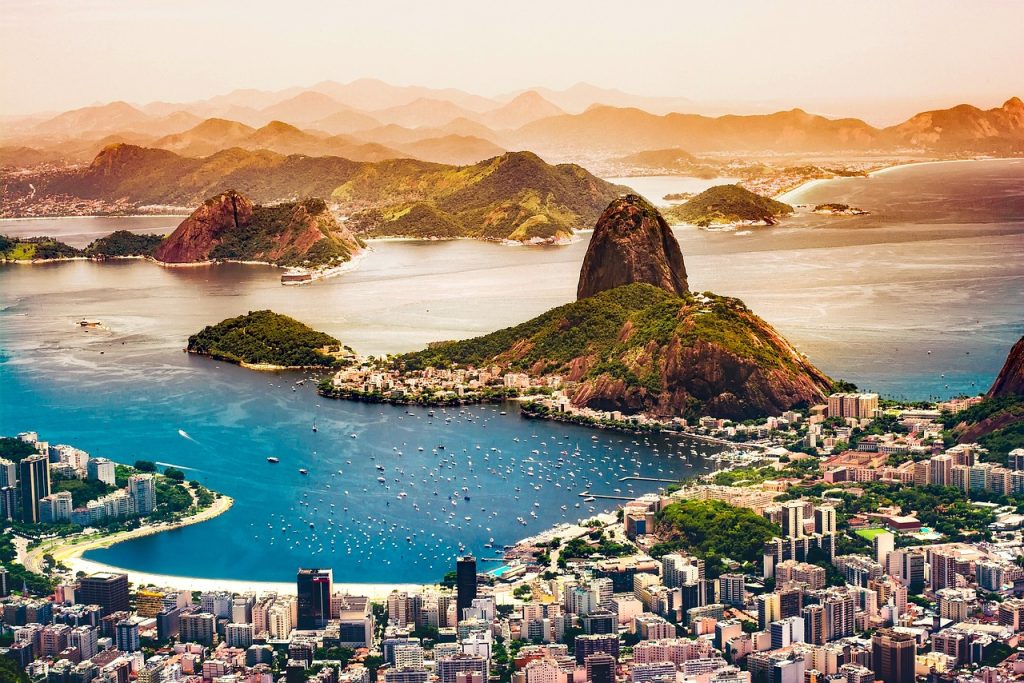Country Details
Brazil, officially known as the Federative Republic of Brazil, is the largest country in South America and the fifth largest in the world, both in terms of land area and population. Here are five important facts about Brazil:
1. Rich Cultural Diversity: Brazil is renowned for its vibrant and diverse culture, shaped by the fusion of indigenous, African, and European influences. It is a melting pot of traditions, music, dance, and festivals. The country is famous for its samba, bossa nova, and capoeira, as well as its colorful Carnival celebrations, which attract millions of visitors from around the globe.
2. Biodiversity and Natural Wonders: Brazil is home to an incredibly diverse ecosystem, boasting the largest portion of the Amazon Rainforest, which is considered the "lungs of the Earth." The country also houses the Pantanal, the world's largest tropical wetland, and the Cerrado, a vast savanna with rich biodiversity. Brazil's natural wonders include the stunning Iguazu Falls, the Amazon River, and the unique sand dunes of Lençóis Maranhenses National Park.
3. Soccer Passion: Soccer, or futebol, is deeply ingrained in Brazilian culture. The country has a rich soccer history and is the most successful nation in the FIFA World Cup, having won the tournament a record five times. Brazilians' love for the sport is evident in their passion, skill, and the countless football legends they have produced, such as Pelé, Zico, Ronaldo, Ronaldinho, and Neymar.
4. Economic Powerhouse: Brazil has one of the largest economies in the world, characterized by a mix of industries, including agriculture, manufacturing, mining, and services. It is a major exporter of commodities like soybeans, coffee, and beef. The country's economy also benefits from tourism, with visitors drawn to its stunning landscapes, cultural heritage, and iconic landmarks such as the Christ the Redeemer statue in Rio de Janeiro.
5. Social and Economic Challenges: Despite its economic strength, Brazil faces significant social and economic challenges. Income inequality, poverty, and crime rates remain high, particularly in urban areas. The country has been working towards addressing these issues through social programs and initiatives to improve education, healthcare, and infrastructure, aiming to create more inclusive and sustainable development.
Immigration Details
Immigrating to Brazil can be achieved through various pathways. Here are some of the common ways to immigrate, including the Golden Visa program, establishing a company, real estate investment, work permits, and studying:
1. Golden Visa:
- Brazil does not have a specific Golden Visa program like some other countries. However, Brazil offers a permanent residency visa known as the Investor Visa (VIPER) for foreign investors who meet certain criteria, such as making a significant financial investment in the country.
- The requirements and capital investment amount for the Investor Visa can vary, and it's advisable to consult with Brazilian authorities or seek professional advice for the most up-to-date information.
- Timeline and fees: The processing time and fees for the Investor Visa can vary, but it generally takes several months. The fees may include application fees, legal fees, and investment-related costs.
2. Establishing a Company:
- Capital requirements: Establishing a company in Brazil involves meeting the specific capital requirements based on the chosen legal form, such as a limited liability company (Ltda.) or a corporation (S.A.). The minimum capital required can vary depending on the activity and location of the company.
- Employing locals: When establishing a company in Brazil, it may be necessary to employ local Brazilian citizens, depending on the nature of the business and its legal structure. The specific requirements and employment regulations can be obtained from Brazilian authorities or legal professionals.
- Residency permit: As a company owner, you can apply for a residency permit based on your business activities in Brazil.
- Timeline and fees: The timeline for establishing a company and obtaining a residency permit can vary, but it generally takes several months. The fees can include company registration costs, legal fees, and administrative charges.
3. Real Estate Investment:
- Brazil offers a Real Estate Investor Visa for foreign investors who purchase properties of a specified minimum value in Brazil.
- Residency permit: Upon purchasing eligible real estate, you can apply for a residency permit. You will need to provide documents such as proof of property ownership, financial capability, and a valid passport.
- Timeline and fees: The processing time for obtaining a residency permit through real estate investment can vary, but it generally takes several months. The fees may include property purchase costs, administrative fees, and application fees.
4. Work Permit:
- Finding a job: Securing a job offer from a Brazilian employer is essential for obtaining a work permit. The employer will need to sponsor your work visa and provide necessary documentation, including an employment contract and proof of qualifications.
- Work visa and residency permit: Once you have a job offer, your employer will apply for a work visa on your behalf. Upon arrival in Brazil, you will need to undergo medical examinations and obtain a residency permit.
- Timeline and fees: The processing time for work visas and residency permits can vary, but it generally takes several weeks to a few months. The fees associated with work permits and residency permits can include visa application fees, administrative charges, and medical examination costs.
5. Study-based Immigration:
- Obtain admission: Apply and get accepted into a recognized educational institution in Brazil.
- Student visa: Once accepted, the educational institution will assist you in obtaining a student visa and necessary documentation, including proof of enrollment, financial capability, and a valid passport.
- Residency permit: Depending on the duration of your studies, you may be eligible to apply for a residency permit during your time as a student in Brazil.
- Timeline and fees: The processing time for student visas can vary, but it generally takes several weeks to a few months. The fees typically include visa application fees and other administrative charges.
It's important to note that immigration regulations and requirements in Brazil can change over time.



Add a review